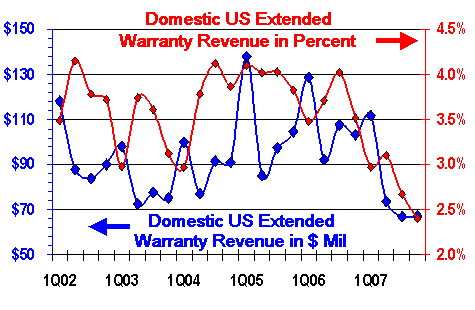Circuit City's Extended Warranties:Are the financial losses and sales declines self-inflicted? Or is this the bleeding edge of an industry downturn that will eventually strip other retailers of their profitability? Circuit City blames both.
For Circuit City Stores Inc., the bad news just keeps getting worse. Product sales are falling, extended warranty sales are slowing, and losses are mounting. Just today, one executive VP left the company and another arrived to take over as chief operating officer. While a slowdown in consumer spending plays a role, a lot of the damage seems to be self-inflicted. And the company is serving up some of the same excuses it used years ago.
A week ago Monday, Circuit City reported that same-store U.S. sales fell 12.2% in December 2007, while overall revenue fell 10%. Circuit City also said extended warranty net sales in its domestic segment during December 2007 totaled $36.1 million, or 2.0% of domestic segment net sales -- a decline of more than 30% when compared with the $52.0 million, or 2.6% of domestic segment net sales, reported in December 2006.
December is of course the heart of the holiday selling season for electronics retailers like Circuit City, and declines of this magnitude are catastrophic. While Circuit City won't release its full financials until April for a fiscal year that ends on February 29, 2008, it's difficult to imagine how the company can recover from a year that's already seen almost $325 million in net losses, with more to come.
Way back on November 1, 2005, Warranty Week featured a column in which we postulated that Circuit City would be an unprofitable company were it not for its extended warranty revenue. Sure, its sales commissions have typically been only 3% or 4% of revenue, but we estimated that these seemingly meager amounts consistently exceeded net income over time. In other words, we said Circuit City was selling electronics at a loss so it could make a profit on the insurance.
Reduced Expenses and Revenue
Since then, Circuit City seems to have put a stop to that practice. In March 2007, the company laid off 3,400 high-paid workers and replaced them with lower-paid new hires. But it turned out that the new hires weren't as good as their predecessors at selling extended warranties -- how to finesse the landing as they jump from touting the features of a product to getting the customer worried about repair cost. The new hires were, however, just as good at selling electronics at a loss as were their predecessors.
But is the damage completely self-inflicted? Or is Circuit City just the latest victim of a spreading retail slowdown? In recent weeks, CompUSA Inc. has closed its stores and is now referring extended warranty customers to Assurant Solutions, its service plan administrator and underwriter. In addition, Tweeter Home Entertainment Group Inc. has now shut its online store and filed for Chapter 11 bankruptcy protection. The Warranty Group, formerly Aon Warranty Group, was its administrator and underwriter.
What will happen to Circuit City in the months ahead is anyone's guess. At last glance this morning, the company's shares were trading a few cents above a fresh new 52-week low, and Wall Street analysts were speculating whether a buyer or a bankruptcy filing was imminent. But the company instead seems to be making a last stand, bringing in a new COO and enticing other top executives to stay by offering them million-dollar retention bonuses.
Assurant Solutions is Circuit City's administrator as well, so the template the company is now creating to make sure CompUSA's customers get the extended warranty service they deserve may come in handy one day. The Warranty Group is also experienced at the management of extended warranty plans sold by a collapsing electronics chain, having gone through it before with Nobody Beats the Wiz. So it's highly likely that claims will continue to be paid no matter what happens to the retailers during this slowdown.
But is it a slowdown? Is this the beginning of a recession? Is it spreading everywhere or is it limited to just the luxuries like shiny new flat screens? And is it simply that they're selling less units while attachment rates remain stable? The Circuit City example would argue quite the opposite, if product sales were down by 10% and extended warranty sales were down by 30%. We'd also estimate that Circuit City's extended warranty attachment rates have fallen from the 1-in-3 range in 2006 to less than 1-in-5 by early this year. So is this a localized and self-inflicted wound? Or is Circuit City simply one of the first and most closely-watched companies to see extended warranties fall out of fashion?
Reasons for the Fall?
Before we go any further, though, let's update some of those charts in the Nov. 1, 2005 column and add some fresh numbers into the mix. This next series of four charts should explain a lot about why the Circuit City story is at its core an extended warranty story.
For many years, Circuit City has reliably reported the amount of sales commissions it collects from the sale of extended warranties, and the percentage of revenue those commissions represented. Every quarter, the company reported two or three billion in total sales and around $100 million in extended warranty commissions, as is depicted in Figure 1 below.
Figure 1
Circuit City Stores:
Total Revenue vs Extended Warranty Revenue
(in $ millions)
Source: Warranty Week from SEC data
Notice how the extended warranty figures seem to crawl along the bottom while total revenue ascends to ever-higher peaks. How could that meager revenue stream affect the whole company? Also, notice how those peaks always come in what we're calling the first quarter of the year: the quarter that covers December, January, and February of Circuit City's fiscal year. That's the holiday shopping season, and both sales and profits usually spike during that quarter. Except this year.
Looking at Figure 1, a reader could reasonably dismiss the idea that extended warranties matter all that much. What seems to matter much more is the relative strength of the holiday season. And this season wasn't very strong. End of story.
Important Source of Revenue
But wait, there's more, as those late-night television offers always exclaim. In Figure 2, we've taken the exact same domestic extended warranty sales data, and compared it to net income figures reported for just Circuit City's domestic retail sector (to make it apples-to-apples, we've excluded results from a small international retail operation the company currently has as well as previous results from an investment in an online car dealership).
Figure 2
Circuit City Stores:
Net Income vs Extended Warranty Revenue (quarterly)
(in $ millions)
Source: Warranty Week from SEC data
This chart makes it plain that domestic net income has exceeded extended warranty revenue only three times in the last 24 quarters (the six-year period between Nov. 30, 2001 and Nov. 30, 2007). It's been close enough two or three other times, but outside of these holiday peaks, the figures have never been less than $80 million apart.
Annual Comparisons
Maybe the fourth quarter makes up for the other three? Nope, that doesn't work either. Because the latest fiscal year is not yet complete, we had to rework the numbers in Figure 3 to include six complete years and one partial year. But you get the point: in 2005 net income was almost half as much as extended warranty revenue and in 2006 it was almost a fourth as much. In two other years they weren't even close, and in two (and probably soon three), there was a net loss despite the contribution of extended warranty revenue.
Figure 3
Circuit City Stores:
Net Income vs Extended Warranty Revenue (annual)
(in $ millions)
Source: Warranty Week from SEC data
Notice also in Figure 2 how in the three most recent quarters of the current fiscal year, extended warranty revenue has declined and net losses have fallen to new lows. The unprecedented nature of these declines and losses is plain in Figure 3. While this doesn't make the case that extended warranties kept Circuit City profitable and their decline is the source of the recent unprofitability, it does make you wonder where the company would be without those sales commissions.
Let's look at it one more way. Figure 4 tracks those extended warranty sales commissions as both a dollar amount (left axis in blue) and as a percentage of total sales (right axis in red). Again, this doesn't prove the case, but it does show how deep the 2007 slowdown has been.
Figure 4
Circuit City Stores:
Domestic US Extended Warranty Revenue
(in $ millions and percent of sales)
Source: Warranty Week from SEC data
As can be seen by the red line, extended warranty revenue has historically been between 3% and 4%, give or take. Actually, back in early 2001 (not on this chart) this percentage was as high as 4.3% of sales on occasion. So to hear that product sales fell 10% and extended warranty sales fell 30%, depressing the ratio to only 2% in what should be the best month of the year for both products and warranties, is nothing short of shocking.
Recent Excuses Offered
So why is this happening? In a Dec. 21, 2007 news release, Circuit City CEO Philip J. Schoonover said he was "very dissatisfied" with the financial results for the quarter ended Nov. 30. "We underestimated the financial impact from the disruption of our transformation work, which contributed to lower close rates, reduced attachments of higher margin accessories and firedog services and lower extended warranty net sales as compared with the prior year. As a result, we are reporting lower sales and higher net losses in the quarter than last year's third quarter."
"We believe that these issues are primarily self-induced and are within our control to improve. Though there is more work to be done, we started to address the execution issues and experienced sequential improvements in close rate, and our key TV attachment basket improved each month of the quarter after hitting a bottom in August."
When details of those quarterly results were eventually reported to the U.S. Securities and Exchange Commission in a Form 10-Q filed on January 9, 2008, it was revealed that the company's gross profit margin was only 19.1% of consolidated net sales compared with 22.1% in the same period last year. This, the company said, was "primarily due to domestic segment decreases in television margins, extended warranty net sales and PC hardware margins and a greater mix of lower margin domestic segment PC hardware sales."
But while these comments detail the magnitude of the decline, they don't pinpoint a reason for it. In the previous quarter's Form 10-Q filing, Circuit City said domestic segment extended warranty net sales fell to 2.7% of sales, down from 4.0% of sales in the same quarter of the previous year. "This decrease," the company said, "was primarily due to reduced attachment rates resulting from poor execution as the business was undergoing significant amounts of change."
Re-examining the Value Proposition
In a June 20, 2007 article in TWICE, Circuit City's now-former multichannel sales executive VP Danny Clark "attributed the quarter�s sharp decline in extended warranty sales to falling TV price points, and to in-store disruptions caused by layoffs and new job responsibilities and procedures. In response, the company is "rationalizing" extended service pricing, taking out costs, and re-examining the "value proposition" of the plans. Clark predicted that attachment rates would improve as associates adopt newly simplified sales procedures and new operational processes allow them to spend more time with customers by performing housekeeping chores before and after store hours."
And then in Circuit City's annual report for the year ended Feb. 28, 2007, the company provided more in the way of a solid reason behind the decline in extended warranty revenue:
"The domestic segment sells extended warranty contracts that provide repair and/or replacement coverage exceeding that offered under traditional manufacturers� warranties. Because unrelated third parties are the primary obligors under these contracts, commission revenue for the unrelated-third-party extended warranty plans is recognized at the time of sale.
"Reflecting our expanded ability to provide high-value services in a growing number of ways, we view extended warranty net sales as one component of many that contributes to both sales and gross margin. Our customer service approach focuses on selling "solutions," with warranties being only one of many available solutions.
"The percent of domestic segment sales attributable to sales of extended warranties was 3.5 percent in fiscal 2007, 3.8 percent in fiscal 2006 and 3.8 percent in fiscal 2005. As average selling prices on many products declined during fiscal 2007, extended warranty net sales as a percentage of domestic segment net sales also declined compared to fiscal 2006. We believe that consumers perceive a reduced need for an extended warranty when the product price has declined. We are reviewing our extended warranty offerings, pricing strategies and in-store training to address this issue."
This annual report was filed with the SEC at the end of April, more than a month after Circuit City announced a "wage management initiative" that resulted in the layoff of 3,400 sales associates "who were paid well above the market-based salary range for their role. New associates will be hired for these positions and compensated at the current market range for the job," the company noted in that March 28 press release.
The layoff of so many highly-paid sales associates -- who were likely to be among the most experienced sellers of extended warranties -- was not cited in the annual report or subsequent statements as a reason for the decline in extended warranty revenue. However, maybe that's what the "execution issues" comment alludes to? Then again, by the time of the layoff, the company had apparently already concluded that consumers had reduced their interest in extended warranties. So why bother employing people who know how to sell them?
Past Excuses Sound Similar?
Furthermore, it's not the first time Circuit City let its top performers go, nor is it the first time the company reduced their incentive to sell extended warranties. In fact, when it converted the salesmen from earning commissions to getting wages, it diminished their motivation to sell extended warranties. But when the company set goals for attachment rates, what it might have inadvertently done is to reduce their motivation to sell anything to a customer who declines to buy an extended warranty. Serving such a customer would only lower their personal attachment rates.
And the story could end there too, with the blame shared by sluggish sales and stolid salesmen. But in our search for reasons behind the decline, we came across very similar language regarding the "slowdown" of 2003.
After the quarter ended August 31 of that year, during which Circuit City's extended warranty sales fell to 3.6% of sales from 3.8% a year earlier, Circuit City said the decrease "primarily is due to declines in average retail prices, which result in consumers purchasing warranty contracts on fewer products." Elsewhere in the same report, the company said gross profit margins fell from 23.7% to 22.6% because of "competitive pricing and shifts in the merchandise mix within the major product categories; increased inventory shrink as we move more product onto the sales floor; and the reduction in extended warranty sales, which carry above average gross profit margins."
In the report for the quarter ended May 31, 2003, the company said "The decrease is due to declines in average retails, which result in warranty contracts on fewer products, and the shift in the sales mix to include more products such as entertainment software for which warranty contracts are not sold."
In its annual report for the year ended February 29, 2004 (fiscal 2004), the company said the decline in extended warranty sales as a percentage of total sales from one year to the next "primarily reflects:
- the declines in average retails and rapid technological developments, both of which encourage consumers to replace products rather than purchase warranties that would cover future repairs and
- weak in-store execution, resulting, we believe, from a substantial increase in part-time sales associates prior to our peak selling season.
"Extended warranty sales as a percentage of total sales stabilized on a year-over-year basis in the fourth quarter of fiscal 2004, but we remain cautious in our outlook given the overall trends of the past two years. The decline in extended warranty sales as a percentage of total sales from fiscal 2002 to fiscal 2003 primarily reflects:
- the higher percentage of our sales mix that was comprised of products, such as entertainment software, for which extended warranties typically are not available;
- the lower percentage of our sales mix represented by personal computers, which typically have high extended warranty penetration rates; and
- the declines in average retails and rapid technological developments.
"The gross profit margin was 22.9 percent in fiscal 2004, 23.6 percent in fiscal 2003 and 24.5 percent in fiscal 2002. The lower gross profit margin in fiscal 2004 primarily reflects reductions in extended warranty sales during the first nine months and, in the fourth quarter, heavy promotions, particularly in December, on desktop personal computers; aggressive industry pricing on big-screen and advanced televisions; and some shifts in the merchandise mix to lower margin products."
Remember, these excuses are four years old. And they were offered after a year in which extended warranties slipped from 3.6% to 3.3% of sales; in which extended warranty sales dropped by 10%; and overall sales fell by 2%. Ah, the good old days.
| 












